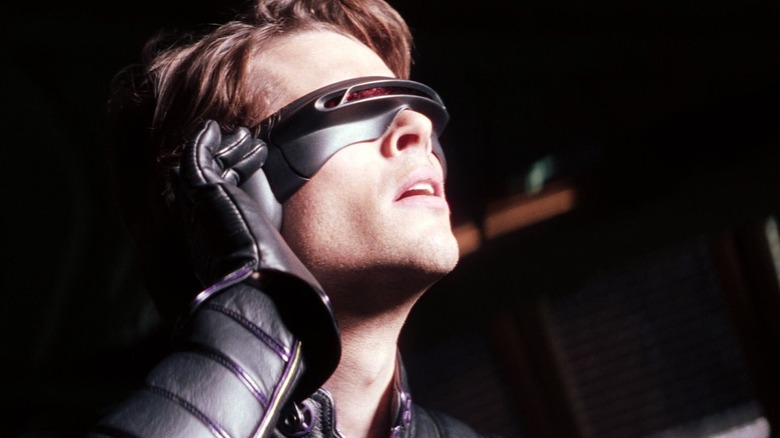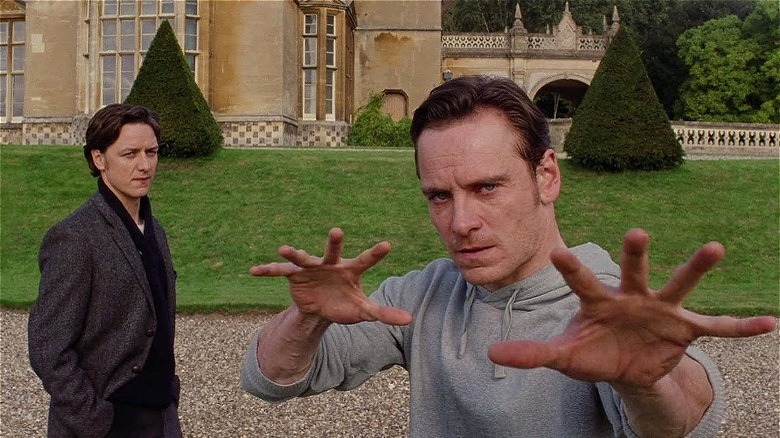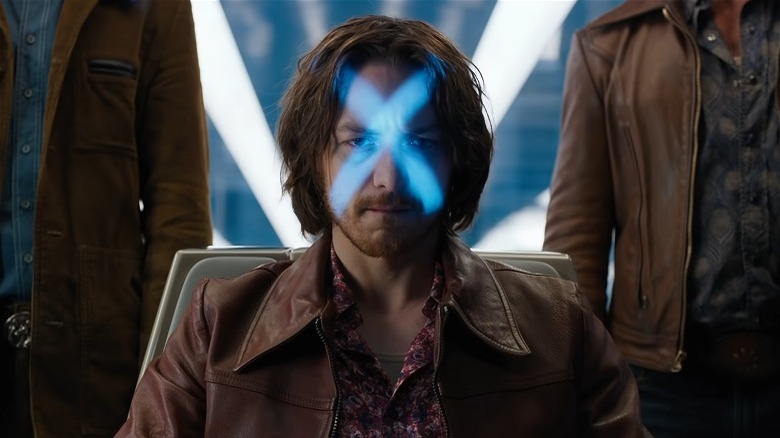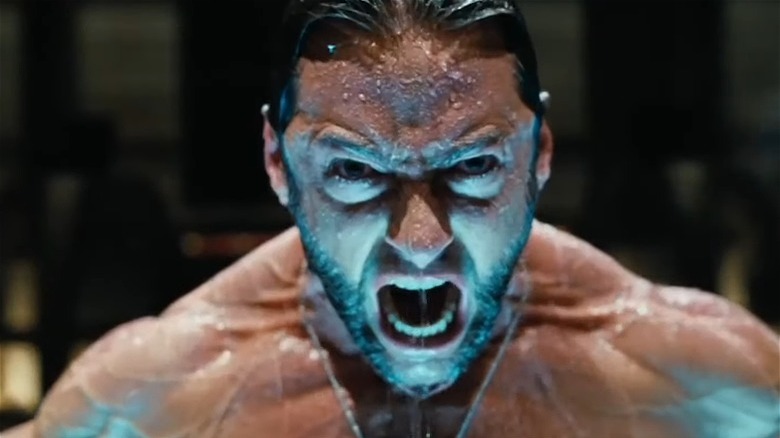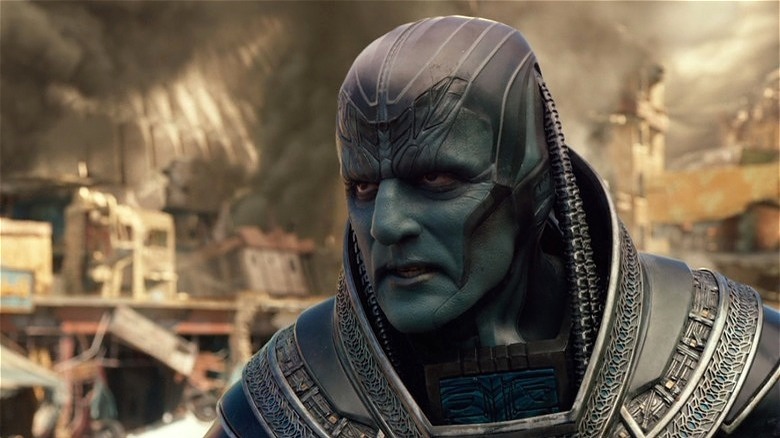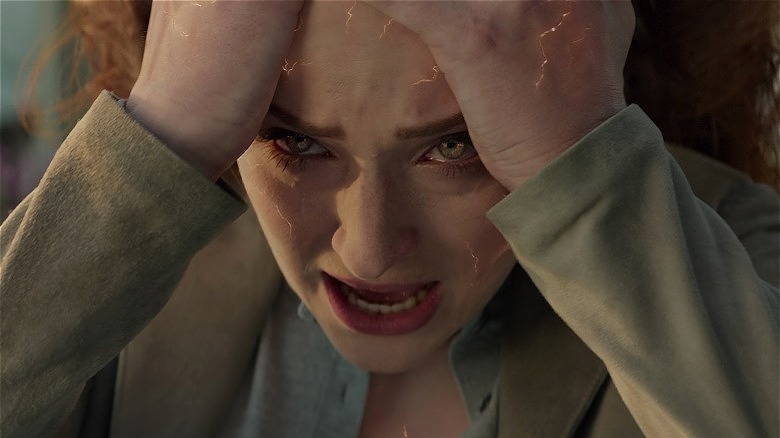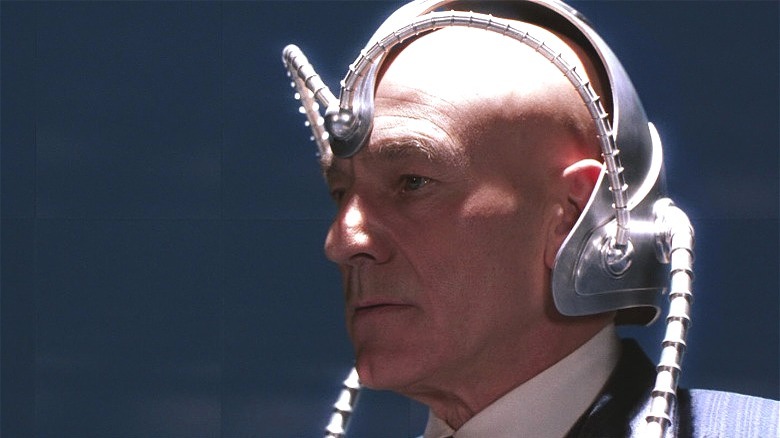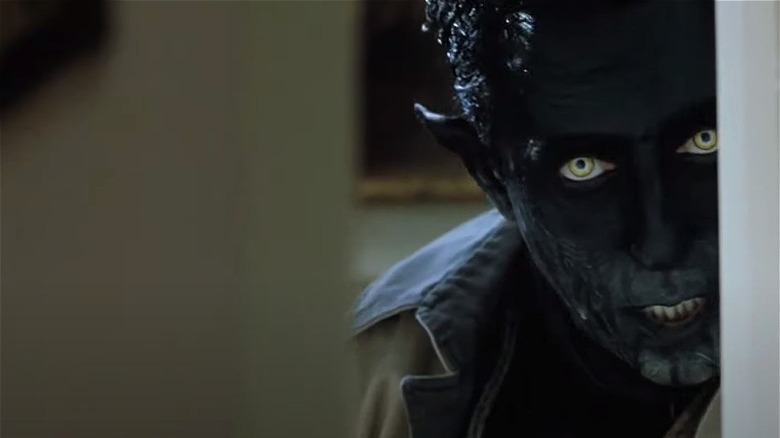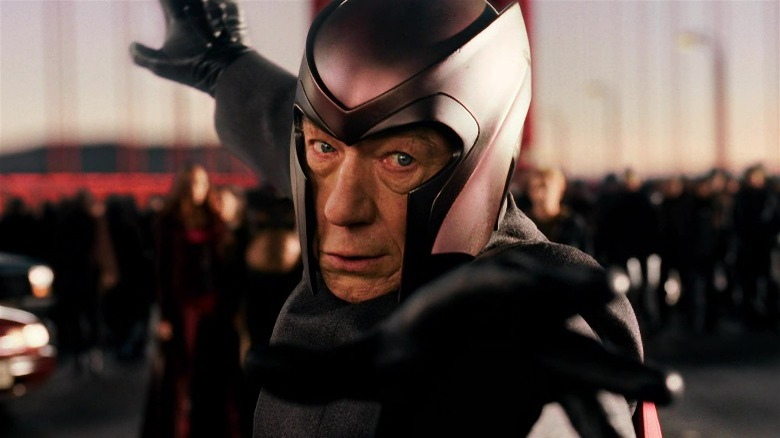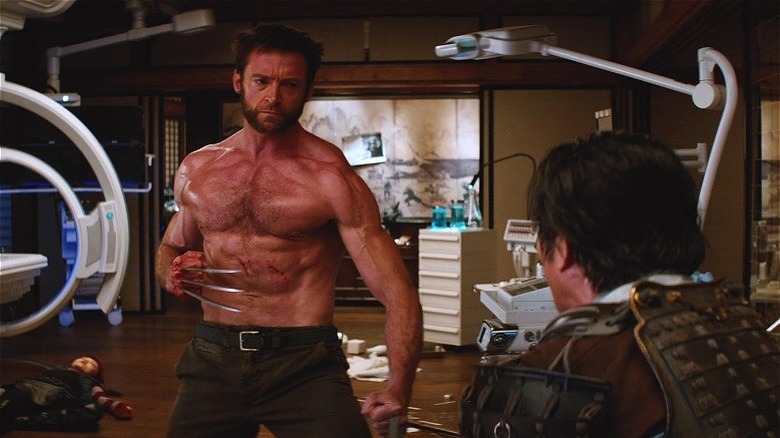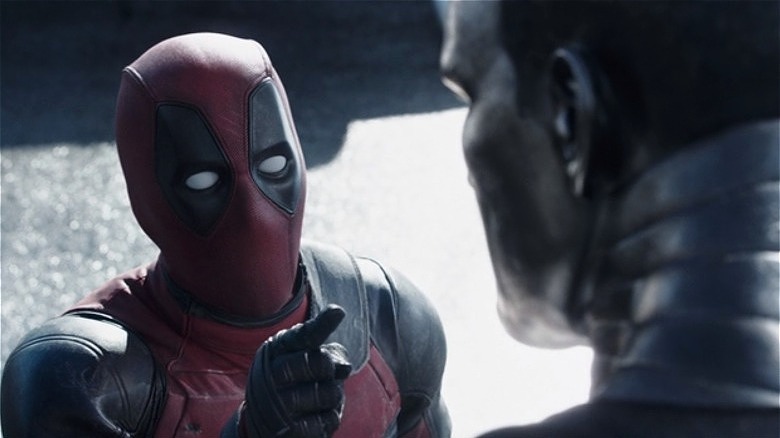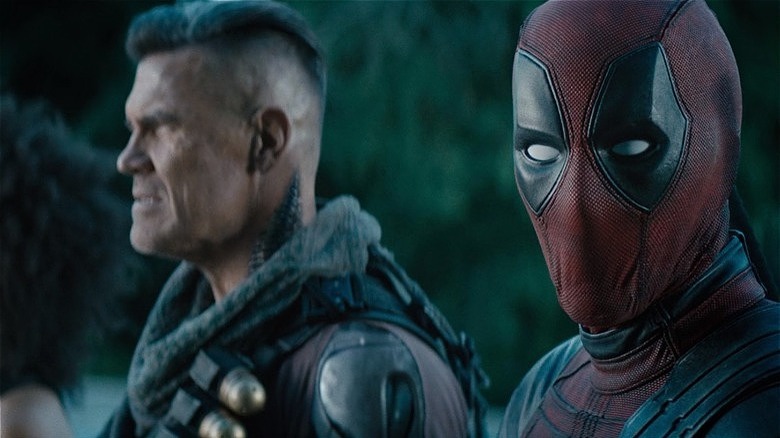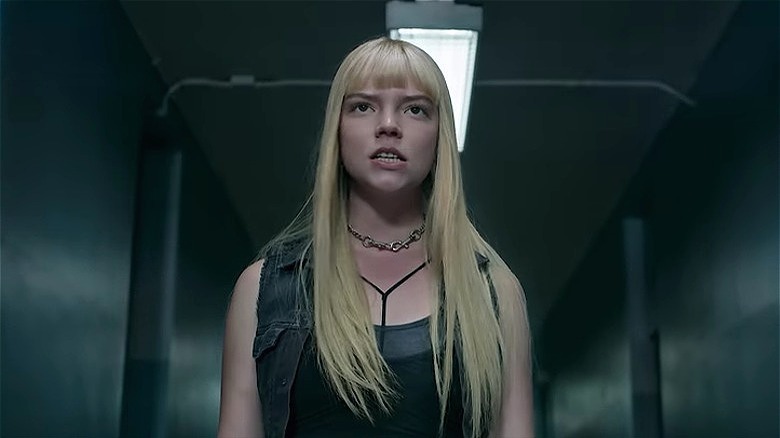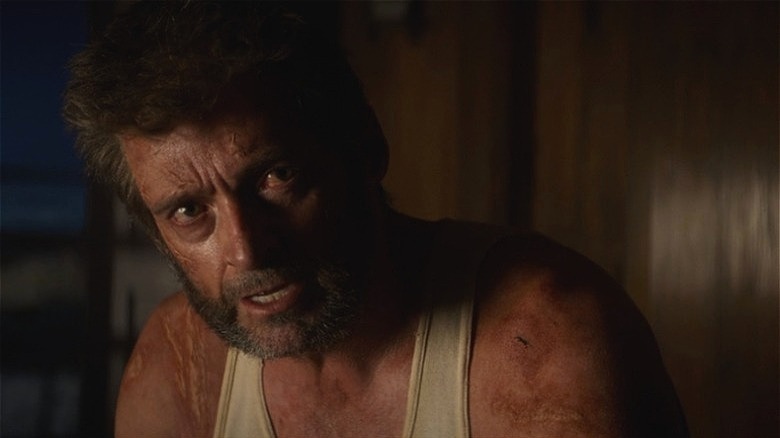How To Watch The X-Men Movies In Chronological Order
Before the Marvel Cinematic Universe changed the game for superheroes on screen, there was "X-Men." The 2000 film assembled an all-star cast including Hugh Jackman, Halle Berry, Ian McKellen, and Patrick Stewart to tell the story of a group of misfit mutants coming together to save the world. The original trilogy concluded with "X-Men: The Last Stand" in 2006, but after that, things got ... complicated.
Various prequels, offshoots, spin-offs, and reboots have been released in the years since. The franchise's timeline twists in on itself, crisscrossing and sometimes running in parallel, full of fits and starts that rewrite and reconfigure our understanding of what happened when. Watching the movies in release order is probably the best way to go — many of the later movies make a play for the nostalgia you feel about the original films — but once you've done that, what about trying to sort things into chronological order? What can we learn about the world of "X-Men" from seeing events in the order they happened, rather than the order they were released? Read on for a chronological timeline of "X-Men" films.
X-Men: First Class (2011)
The first film in the rebooted "X-Men" timeline that launched in the 2010s, "X-Men: First Class" unfolds primarily around the Cuban Missile Crisis in 1962, and it simultaneously tracks the formation of the X-Men and the founding of the Xavier's School for Gifted Youngsters. As such, if you wish to watch the franchise chronologically, it's the earliest film. In this setting, Magneto (Michael Fassbender) and Charles Xavier (James McAvoy) remain allies, though their differing views on mutant supremacy will eventually force them apart.
As a standalone film, "X-Men: First Class" does the job very well, and it'll work as a good introduction to the world for anyone watching these adventures for the first time. We get a dash of the iconography we know and love, but with the trappings of a period piece, and it's fun to see the 1960s versions of these characters. Fan favorites Mystique (Jennifer Lawrence), Emma Frost (January Jones), and Beast (Nicholas Hoult) join the action, but many of the most prominent X-Men from the original films seem conspicuously absent. Keep that in mind as we move forward; from here on out, matters get more complex.
X-Men: Days of Future Past (2014)
"X-Men: Days of Future Past" opened as the second film in the rebooted timeline, and it takes place largely in 1973. However, we've already run into trouble in this little project of watching the franchise chronologically. "Days of Future Past" begins in a dystopian version of 2023, where the X-Men from the original franchise timeline fight an army of mutant-hunting robots called Sentinels. Sent back in time, Wolverine (Hugh Jackman) rounds up the alternate-universe version of his friends (the cast of "X-Men: First Class") to prevent the Sentinels' creation.
You have a choice! The adventures of James McAvoy, Jennifer Lawrence, and crew will continue in several other films, so it might make sense to watch "Days of Future Past" now and get to know the Patrick Stewart version of Professor X, etc. later. Alternately, you can skip ahead to "X-Men Origins: Wolverine" now and watch "Days of Future Past" after "The Wolverine," a path that would fill in timeline gaps after the fact.
We've placed "Days of Future Past" here because, if you're screening the "X-Men" franchise chronologically, you may as well consider McAvoy's Charles Xavier your point-of-view character for now. In bringing back Stewart, Halle Berry, Anna Paquin, etc., the film bets on audience nostalgia for the original "X-Men" trilogy. That won't work if you haven't seen those movies yet, but, hey, nostalgia only goes so far. Better to be able to follow the period-piece timeline for now.
X-Men Origins: Wolverine (2009)
"X-Men Origins: Wolverine" served as the first attempt at giving Hugh Jackman's breakout character his own movie. The prequel attempts to tell Wolverine's origin story, beginning with his time as a young boy with bone claws in the 1800s. (And yes, that's future popstar/"The Idol" star Troye Sivan as the child version of Wolverine!) The movie then jumps ahead to the 1970s; after a brief detour to Vietnam in 1973, which you'll note is the same year as "Days of Future Past," most of the movie takes place in 1979.
At this point, Wolverine becomes the Wolverine we know today. After finding out that someone is targeting the remaining members of the mutant "Team X," he agrees to a treatment that will reinforce his skeleton with adamantium. Gone are the bone claws; instead, he develops the metallic blades familiar from numerous other movies.
Unfortunately, "X-Men Origins: Wolverine" stinks. Jackman gives it his all, as usual, but he can't do much to save a story fixated on answering questions no one asked, among them, "How did Wolverine get his claws?" The movie also received criticism for wasting Ryan Reynolds as a version of Deadpool unlike anything fans loved from the comics. A few years later, Reynolds would get another go-round ... but chronologically, we've got quite a few more movies to sit through between now and then.
X-Men: Apocalypse (2016)
A few years after "X-Men: Days of Future Past" came "X-Men: Apocalypse," a movie that manages to waste Oscar Isaac. He plays the titular Apocalypse, an ancient mutant who reawakens in 1983 and sets out to destroy the world. Buried under layers of facial prosthetics, makeup, and voice modulators, Isaac struggles to do anything worthwhile with the part.
More interestingly, "Apocalypse" introduces several iconic X-Men who were around in the original film series. In this movie, we meet Alexandra Shipp's version of Storm, Tye Sheridan's Cyclops, Evan Peters' Quicksilver, Kodi Smit-McPhee's Nightcrawler, Sophie Turner's Jean Grey, and Lana Condor's Jubilee, among others. It feels a bit like "X-Men: First Class: The Next Generation," but all of the younger actors do a great job rounding out Professor X's mutant team ... even if their battle with Apocalypse proves less than convincing.
By "Apocalypse," the prequel series' timeline starts to stretch believability. Over the course of three movies, the characters have progressed from 1962 to 1983, but those three movies only took five years to make; little is done to even pretend to age the actors. At this point, it's distracting; thankfully, only one more movie remains in this part of the timeline.
Dark Phoenix (2019)
"Dark Phoenix" marks the first time you see the legendary Dark Phoenix storyline adapted from the comics. That's a shame. You'll notice a similar storyline several movies from now, and while that one's not great either, it's better than this mess. "Dark Phoenix" centers around Sophie Turner's Jean Grey. She possesses psychic powers that include telekinesis, and in this film, a cosmic force causes her to lose control. Her relationships with her fellow X-Men crumble, and she transforms from hero to villain as her powers become too much for her to handle.
By "Dark Phoenix," the original cast of "X-Men: First Class" is over it. One need only pay attention to Jennifer Lawrence's Mystique makeup in this movie to see just how over it she was. What was once a jaw-dropping practical effect that took six hours in the makeup chair evolves into what appears to be a Party City costume, complete with obvious face paint and a terrible wig. It's a disappointing note for the series to go out on, but thankfully, we're watching chronologically. This way, some good movies await!
X-Men (2000)
"X-Men," the sixth movie in the series chronologically, but the first one released, arrived in theaters all the way back in 2000. Both an intentional Holocaust echo and an eerie precursor to the surveillance state concerns that would come to define that decade, "X-Men" gives us a senator introducing a "Mutant Registration Act," designed to force all superpowered humans to register their abilities with the government. Professor Charles Xavier (Patrick Stewart) and his school for gifted youngsters try to respond peacefully, while his old ally-turned-nemesis Magneto (Ian McKellen) and his Brotherhood of Mutants choose a not-so-peaceful path.
This movie deserves credit for introducing a generation of moviegoers to the X-Men while not being, strictly speaking, an origin story. Sure, it's the first time Rogue (Anna Paquin) encounters the X-Men, but overall, we understand that the mutants have been active in society for a while. (After all, the mutants are so present that Congress moves to act against them). Toward the end of the decade, superhero films would become mired in endless origin stories, but "X-Men" understands that audiences will be fine being dropped into a world like this as long as it's internally consistent.
X2 (2003)
In "X2," the government goes even further. After Nightcrawler (Alan Cumming) attacks the president, Col. William Stryker (Brian Cox) leads a crusade to wipe out mutantkind. Professor X considers this enough of a threat for his X-Men to begrudgingly ally themselves with Magneto's Brotherhood of Mutants.
Cumming makes for a deliciously batty cast addition, and everyone else gets fun moments to shine too. Halle Berry dodged a bullet, as bringing Storm back caused her to drop out of the legendary flop "Gigli." The film also dives deeper into the life of Iceman (Shawn Ashmore), including a touching scene where he "comes out" as a mutant to his family, really driving home the queer narrative inherent in many "X-Men" stories.
As far as timelines go, "X2" sits comfortably between "X-Men" and "X-Men: The Last Stand," the middle part of an intended trilogy. There's no time-jumping, retcons, do-overs, rights issues, or remakes at play here, a welcome change this far along in a chronological viewing of the series.
X-Men: The Last Stand (2006)
If you're paying close attention during your "X-Men" franchise chronological watch, you're already well aware of what transpires in "X-Men: The Last Stand." Wolverine's guilt over what Jean Grey's (Famke Janssen) experiences here powers his arc in "X-Men: Days of Future Past," and in fact, that movie's timeline meddling undoes the climax of this one. This will also be your second time witnessing an adaptation of the comics' Dark Phoenix storyline, after the fittingly-titled "Dark Phoenix." It's not great here either, but at least it's better than "Dark Phoenix." Nearly all of these movies are.
This time around, the X-Men (and their ideological adversaries in the Brotherhood of Mutants) grapple with the ethical fallout of a new scientific breakthrough that claims to be able to "cure" mutants. Magneto fears a mutant genocide, while Professor X urges caution. It all builds to an action setpiece on the Golden Gate Bridge that still stands as one of the franchise's most memorable, even if the special effects haven't aged well.
The Wolverine (2013)
The second attempt at giving Hugh Jackman's Wolverine his own spin-off film goes by the simple title, "The Wolverine." The film sends Wolverine to Japan, where he gets tangled up with the Yakuza. Along the way, he is implanted with a device that takes away his healing abilities, meaning the usually-immortal man must confront his mortality for the first time.
We don't know precisely when the movie takes place, but we can make some educated guesses. "The Wolverine" opens with a flashback set during the bombing of Nagasaki, but otherwise the bulk of the story unfolds sometime after the events of "X-Men: The Last Stand." Wolverine is wracked with guilt over his role in what happened to Jean Grey, and his arc here involves letting go of the painful ramifications. This film also clearly plays out before the present-day sections of "Days of Future Past." In fact, "The Wolverine's" credits sequence provides the bridge to that film; Professor X and Magneto show up to tell Wolverine about a dangerous weapon that could wipe out all of mutantkind. We've seen that already; it's the weapon from "Days of Future Past."
In other words, if you're tracking Wolverine chronologically, you'll want to jump back to "Days of Future Past" next. If, instead, you consider events that happened in the past to be past, it's safe to move on to "Deadpool."
Deadpool (2016)
A version of Ryan Reynolds' Deadpool appeared in "X-Men Origins: Wolverine," but that character barely resembled the one that would later lead his own spin-off. (For one thing, that Deadpool had his mouth stitched shut; in "Deadpool," he talks. A lot). It's easy to forget that this is an "X-Men" movie, as it doesn't cross over with any other characters from the rest of the franchise, but Deadpool does indeed team up with Colossus (Stefan Kapičić) and Negasonic Teenage Warhead (Brianna Hildebrand); they're both members of the X-Men team in the comics. Because of this, it's hard to pinpoint exactly where "Deadpool" falls, but it's pretty safe to assume it takes place around the year it was released.
Mostly, this counts as an origin story for the quippy character. Upon receiving his cancer diagnosis, Wade Wilson participates in an experimental treatment meant to trigger any latent mutation hiding in his genes. The experiment results in both newfound healing powers and a scarred visage, and he decides to don a costume and call himself Deadpool.
Unlike the vast majority of the "X-Men" films, "Deadpool" constantly breaks the fourth wall. The character seems to be fully aware that he's in a movie, and he comments on the absurdity of the superhero genre multiple times. He even pokes fun at the confusing reboot/prequel/crossover of it all, asking his X-Men friends whether he'll be meeting "Stewart or McAvoy?" when they promise to take him to Professor X.
Deadpool 2 (2018)
"Deadpool 2" brings the foulmouthed mercenary ever closer to the X-Men. This time, after his girlfriend Vanessa (Morena Baccarin) is killed, Deadpool becomes suicidal. He can't die, however, thanks to his mutant abilities. Rescued by Colossus, Deadpool helps form the X-Force, an X-Men offshoot that helpfully skirts the rights issues plaguing Marvel and Fox at the time the movie was made.
The rights issues don't stop Deadpool from mentioning characters who can't legally appear, which he does often. Cue numerous jokes about Wolverine, and thanks to Deadpool's frequent fourth-wall-breaking, several jokes too about Hugh Jackman.
Still, it feels like the "Deadpool" movies exist in a weird bubble, connected to but separate from the other films in the universe. "Deadpool 2" puts its hero into conflict with the Essex Corp, an evil organization teased at the end of "X-Men: Apocalypse." Considering the same organization also shows up in "The New Mutants," one can't help but feel like those films were meant to build up to something we won't actually get to see. Instead, the year after the release of "Deadpool 2," Disney bought 21st Century Fox. That means Deadpool can now join the X-Men, and it means the X-Men will be part of the Marvel Cinematic Universe. What that will look like remains to be seen.
The New Mutants (2020)
"The New Mutants" is a difficult one to place on the "X-Men" timeline because it feels so separate from all of the other sub-franchises. It would be tough to place it on a list of intended release order too. The film was delayed for years, and it ultimately dropped during the COVID-19 pandemic with little fanfare. The rights to the X-Men changed hands in the meantime, and plans for "The New Mutants" to kick off its own trilogy of horror films were ultimately scrapped in favor of bringing the X-Men into the Marvel Cinematic Universe.
The film follows a group of young mutants who are being studied by what turns out to be Essex Corp, the same shadowy organization that played a role in "Deadpool 2" and the "X-Men: Apocalypse" credits sequence. Blu Hunt plays Dani Moonstar; she meets fellow mutants like Magik (Anya Taylor Joy), Wolfsbane (Maisie Williams), and Cannonball (Charlie Heaton) in the institution.
It's unclear when exactly the film takes place, or how we should view Essex Corp's involvement compared to "Deadpool 2." So, why include "The New Mutants" toward the end? While the movie's tech is decidedly low-fi, including an appearance by some "Buffy the Vampire Slayer" DVDs, one particular moment features the characters witnessing something that also plays out in "Logan." This suggests that the films take place around the same time, even if "The New Mutants" fails to mention the mutant genocide at the center of "Logan." Details, details.
Logan (2017)
James Mangold's "Logan" holds the distinction of being the "X-Men" film that takes place furthest in the future. Set in the far-off year of 2029 — at least, it seemed far-off upon release in 2017 — it imagines a world where no mutants have been born in a quarter century. Logan — Hugh Jackman's Wolverine — is an older man by now, not the agile young beast he was in the early films. Professor X (Patrick Stewart again) is even older, and living with the regret of having been responsible for accidentally wiping out the majority of the X-Men we once knew and loved.
"Logan" is a surprisingly moving film that doesn't skimp on the action. We've been watching Stewart and Jackman play these characters for multiple decades, we feel real pathos in seeing them aged, broken-down, and burdened by regret. Wolverine discovers a young girl named Laura (Dafne Keen) with mutant powers, however, and he embarks on a quest that might provide a measure of hope for a mutant future.
The film provides a fitting sendoff to the franchise, and especially to Jackman's portrayal of Wolverine, but of course, nothing good can ever truly die in our age of nostalgia-drenched IP surprises. It's no surprise, then, that Jackman will return in "Deadpool 3," bringing the Wolverine we're used to into the sidelined timeline of the Ryan Reynolds franchise.
